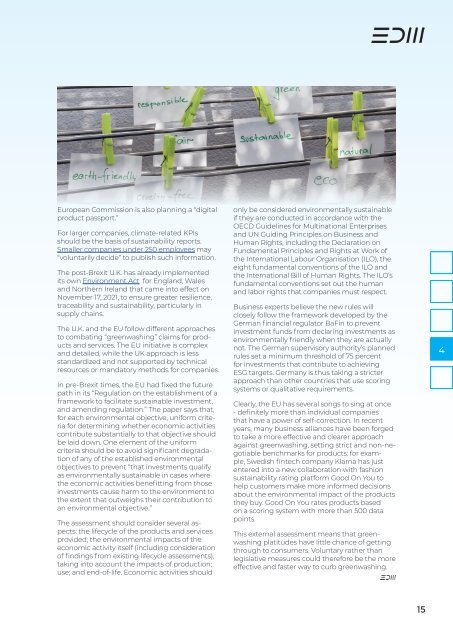EDM Sustainable Business 2022
EDM Business editions represents the board-level conversation in multichannel retail focussing commercial growth and connection with the digital, demanding consumer.
EDM Business editions represents the board-level conversation in multichannel retail focussing commercial growth and connection with the digital, demanding consumer.
You also want an ePaper? Increase the reach of your titles
YUMPU automatically turns print PDFs into web optimized ePapers that Google loves.
European Commission is also planning a “digital<br />
product passport.”<br />
For larger companies, climate-related KPIs<br />
should be the basis of sustainability reports.<br />
Smaller companies under 250 employees may<br />
“voluntarily decide” to publish such information.<br />
The post-Brexit U.K. has already implemented<br />
its own Environment Act for England, Wales<br />
and Northern Ireland that came into effect on<br />
November 17, 2021, to ensure greater resilience,<br />
traceability and sustainability, particularly in<br />
supply chains.<br />
The U.K. and the EU follow different approaches<br />
to combating “greenwashing” claims for products<br />
and services. The EU initiative is complex<br />
and detailed, while the UK approach is less<br />
standardized and not supported by technical<br />
resources or mandatory methods for companies.<br />
In pre-Brexit times, the EU had fixed the future<br />
path in its “Regulation on the establishment of a<br />
framework to facilitate sustainable investment,<br />
and amending regulation.” The paper says that,<br />
for each environmental objective, uniform criteria<br />
for determining whether economic activities<br />
contribute substantially to that objective should<br />
be laid down. One element of the uniform<br />
criteria should be to avoid significant degradation<br />
of any of the established environmental<br />
objectives to prevent “that investments qualify<br />
as environmentally sustainable in cases where<br />
the economic activities benefitting from those<br />
investments cause harm to the environment to<br />
the extent that outweighs their contribution to<br />
an environmental objective.”<br />
The assessment should consider several aspects:<br />
the lifecycle of the products and services<br />
provided; the environmental impacts of the<br />
economic activity itself (including consideration<br />
of findings from existing lifecycle assessments),<br />
taking into account the impacts of production;<br />
use; and end-of-life. Economic activities should<br />
only be considered environmentally sustainable<br />
if they are conducted in accordance with the<br />
OECD Guidelines for Multinational Enterprises<br />
and UN Guiding Principles on <strong>Business</strong> and<br />
Human Rights, including the Declaration on<br />
Fundamental Principles and Rights at Work of<br />
the International Labour Organisation (ILO), the<br />
eight fundamental conventions of the ILO and<br />
the International Bill of Human Rights. The ILO’s<br />
fundamental conventions set out the human<br />
and labor rights that companies must respect.<br />
<strong>Business</strong> experts believe the new rules will<br />
closely follow the framework developed by the<br />
German financial regulator BaFin to prevent<br />
investment funds from declaring investments as<br />
environmentally friendly when they are actually<br />
not. The German supervisory authority’s planned<br />
rules set a minimum threshold of 75 percent<br />
for investments that contribute to achieving<br />
ESG targets. Germany is thus taking a stricter<br />
approach than other countries that use scoring<br />
systems or qualitative requirements.<br />
Clearly, the EU has several songs to sing at once<br />
- definitely more than individual companies<br />
that have a power of self-correction. In recent<br />
years, many business alliances have been forged<br />
to take a more effective and clearer approach<br />
against greenwashing, setting strict and non-negotiable<br />
benchmarks for products: for example,<br />
Swedish fintech company Klarna has just<br />
entered into a new collaboration with fashion<br />
sustainability rating platform Good On You to<br />
help customers make more informed decisions<br />
about the environmental impact of the products<br />
they buy. Good On You rates products based<br />
on a scoring system with more than 500 data<br />
points.<br />
This external assessment means that greenwashing<br />
platitudes have little chance of getting<br />
through to consumers. Voluntary rather than<br />
legislative measures could therefore be the more<br />
effective and faster way to curb greenwashing.<br />
1<br />
2<br />
4<br />
4<br />
5<br />
15


